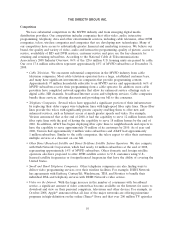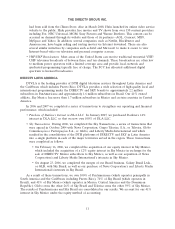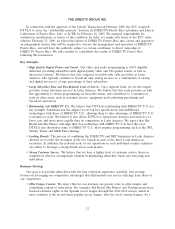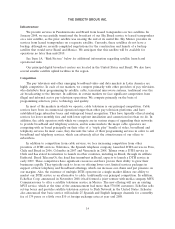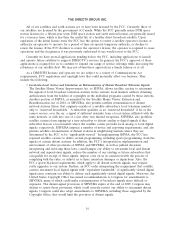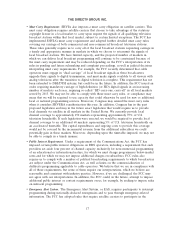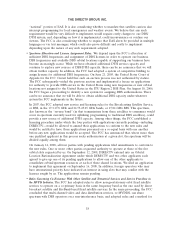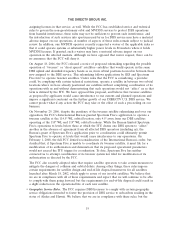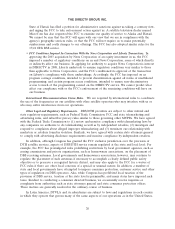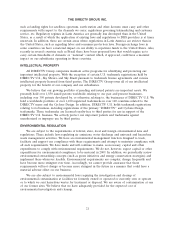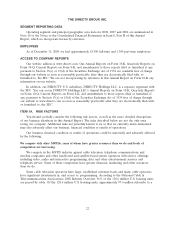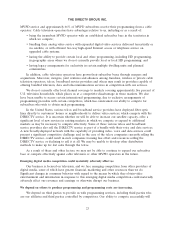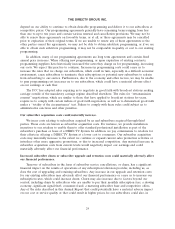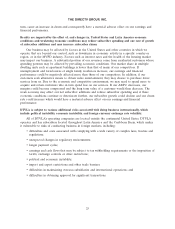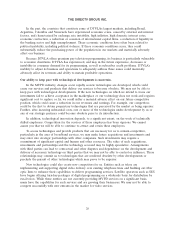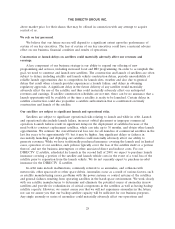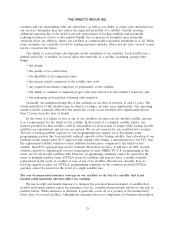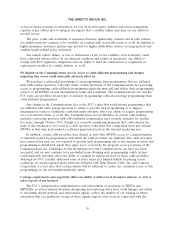DIRECTV 2008 Annual Report Download - page 33
Download and view the complete annual report
Please find page 33 of the 2008 DIRECTV annual report below. You can navigate through the pages in the report by either clicking on the pages listed below, or by using the keyword search tool below to find specific information within the annual report.THE DIRECTV GROUP, INC.
State of Hawaii has filed a petition for administrative sanctions against us taking a contrary view,
and urging the FCC to take enforcement action against us. A satellite television dealer named
MicroCom has also requested the FCC to examine our quality of service to Alaska and Hawaii.
We cannot be sure that the FCC will agree with our view that we are in compliance with the
agency’s geographic services rules, or that the FCC will not require us to make potentially
cumbersome and costly changes to our offerings. The FCC has also adopted similar rules for the
17/24 GHz BSS service.
•FCC Conditions Imposed In Connection With the News Corporation and Liberty Transactions. In
approving the 2003 acquisition by News Corporation of an equity investment in us, the FCC
imposed a number of regulatory conditions on us and News Corporation, some of which directly
or indirectly affect our business. In applying for authority to acquire News Corporation’s interest
in DIRECTV in 2008, Liberty undertook to assume regulatory conditions very similar to those
then applicable to News Corporation, and the FCC conditioned its approval of the transaction
on Liberty’s compliance with those undertakings. Accordingly, the FCC has imposed on us
program carriage conditions, intended to prevent discrimination against all forms of unaffiliated
programming; and certain program access conditions, intended to ensure non-discriminatory
access to much of the programming carried on the DIRECTV service. We cannot predict what
effect our compliance with or the FCC’s enforcement of the remaining conditions will have on
our business.
International Telecommunications Union Rules. We are required by international rules to coordinate
the use of the frequencies on our satellites with other satellite operators who may interfere with us or
who may suffer interference from our operations.
Other Legal and Regulatory Requirements. DBS/DTH providers are subject to other federal and
state regulatory requirements, such as Federal Trade Commission, FCC and state telemarketing and
advertising rules, and subscriber privacy rules similar to those governing other MVPDs. We have agreed
with the Federal Trade Commission to (1) review and monitor compliance with telemarketing laws by
any companies we authorize to do telemarketing as well as by independent retailers, (2) investigate and
respond to complaints about alleged improper telemarketing and (3) terminate our relationship with
marketers or retailers found in violation. Similarly, we have agreed with certain state attorneys general
to comply with advertising disclosure requirements and monitor compliance by independent retailers.
In addition, although Congress has granted the FCC exclusive jurisdiction over the provision of
DTH satellite services, aspects of DBS/DTH service remain regulated at the state and local level. For
example, the FCC has promulgated rules prohibiting restrictions by local government agencies, such as
zoning commissions and private organizations, such as homeowners associations, on the placement of
DBS receiving antennas. Local governments and homeowners associations, however, may continue to
regulate the placement of such antennas if necessary to accomplish a clearly defined public safety
objective or to preserve a recognized historic district, and may also apply to the FCC for a waiver of
FCC rules if there are other local concerns of a special or unusual nature. In addition, a number of
state and local governments have attempted to impose consumer protection, customer service and other
types of regulation on DBS operators. Also, while Congress has prohibited local taxation of the
provision of DBS service, taxation at the state level is permissible, and many states have imposed such
taxes. Incident to conducting a consumer directed business, we occasionally receive inquiries or
complaints from authorities such as state attorneys general and state consumer protection offices.
These matters are generally resolved in the ordinary course of business.
In Latin America, DTVLA and its subsidiaries are subject to laws and regulations in each country
in which they operate that govern many of the same aspects of our operations as in the United States,
20


